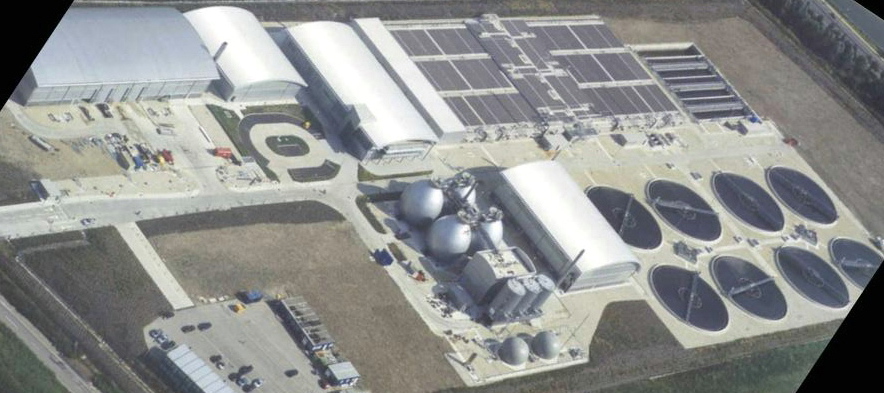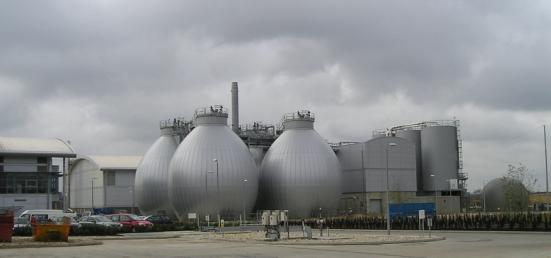
WASTEWATER RESEARCH AND INDUSTRY SUPPORT FORUM
Meeting 25th January 2005
Please note that for older reports some links will be to sites that are no longer active.
This was the Forum’s 26th meeting; it was hosted by Thames Water at its new flagship Reading Wastewater Treatment Works which was only officially opened by Defra Minister Elliott Morley the previous week
.
The forum visited the site on 3rd April 2003 when it was under construction and it was impressive to see how the concepts had been turned into reality. The old works was built in the 1870s and the most recent upgrade in the 1960s. The town had grown out around the works and for several years there had been odour complaints from the nearby houses. It was realised that the old works with its biologic filters could not be upgraded to eliminate the odour issues and to meet the new effluent consent standards which ramped up from 20 mgBOD/l to 5 and from 5 mgNH4/l to 2; the answer was to build a new enclosed works on adjacent land that had historically been sludge lagoons. The whole project cost £80 million of which £16 million was decontaminating the new site and £12 million was odour management.
The new site is only half the footprint of the original so compact design for this 285,000 population equivalent works was essential. In addition a restriction of 5 odour units at the boundary was applied, which means that everything apart from the final clarifiers and the tertiary slow sand filters is covered and all of the air is managed.
Thames Water has experience of struvite harvesting so it was well placed to design the works and returns of liquors so as to avoid the critical concentrations of ammonium, magnesium and phosphate occurring together. Effluent from a large brewery’s treatment plant that constitutes 25% of the load is routed to the aeration bioreactor to feed the biological nutrient removal (BNR) section. BNR routinely achieve the 1 mgP/l phosphate consent and though iron dosing is available as a backup it is seldom needed.

The steely sky set off the silver clad egg-shaped digesters perfectly. Eggs were chosen for aesthetic rather than process considerations. The surrounding land is being developed for high-tech business park and for housing, hotels and retailing so appearance is important, as well as odour. Sludge storage times are minimised to avoid creation of odourants. Short-retention AutoThermic Aerobic Digestion (ATAD) is used to disinfect the feed sludge and this also provides all the heating requirements for the mesophilic anaerobic digesters (MAD) which can be fed at 10%DS. Digested biosolids are dewatered with centrifuges and the cake is pumped to silos (shown right above) that have 14 days storage capacity. There is good demand from local farms for the cake recycled by TERRA ECO◊SYSTEMS.
Dr Manocher Asaadi described the interesting work of a PhD student who had been with Thames. She had applied food chemistry to assess the digestibility of various sludges and correlated it with MAD performance in laboratory chemostats. Written like that it seems a simple idea but it has not been done before and the results are very promising. He also described the very cost effective conversion of Swindon biogas digestion to 2-phase, where the microbial processes of acidogenesis and methanogensis are separated instead of being combined in a mixed MAD; this has effectively increased the capacity of the plant by 50% at much less cost than building new mixed MADs.
Dr Tim Evans gave some feedback from the Oxford Farming Conference (OFC) to the Forum. The OFC is the premier strategic conference for the farming industry. Two aspects of particular interest were reform of the Common Agricultural Policy (CAP) and the changed attitude to self-sufficiency in food production. From 1st January 2005 farmers will be paid to manage the landscape rather than to produce food, this will be done through “cross-compliance” which means that payment will be conditional upon complying with codes of good practice, etc. This should increase the emphasis on maintaining soil organic matter, sequester carbon in the soil, decrease diffuse pollution and will mean that anybody working on the land, including biosolids recyclers, will have to give due attention to the soil. The UK is currently 74% self-sufficient in food, Lord Whitty told the OFC the government no longer considers this a priority and that we can import food, but is this morally responsible when we are facing the twin pressures of climate change and a predicted 50% increase in the global population? Should the UK and other European countries export their food production, knowing there will be environmental damage such as forest clearance, in order to obtain some local environmental benefit?
The Forum discussed the most recent business planning cycle with Simon Walster of Ofwat. On the day of the meeting 3 water-only companies and 2 water-and-sewerage companies had still not confirmed whether to ask the water regulator to refer their price limits to the Competition Commission for re-determination but by the end of the month all 23 water companies in England and Wales have agreed to work within new price limits set for them by Ofwat for 2005 to 2010. Companies had asked for £21bn but Ofwat had only allowed £16.8bn, they said it was 'a tough call' and that they face significant challenges in meeting Ofwat's efficiency targets.
Water bills will increase mainly because of work needed to comply with new [European] legislation. Contrary to the expectation at privatisation that bills would level off after a period of catchup, it is now expected they will continue to increase as new obligations continue to be laid upon the industry. The effect of the Water Framework Directive will be in the next planning round (PR05) so bills will continue to increase.
It was recognised that previous plans had not allowed enough for maintenance of assets and PR04 was intended to redress this deficiency. The rate of allowed replacement of underground assets equates to an assumed life of 100 years for water distribution but >1000 years for sewers. Ofwat has tried to be fair to customers, fair to companies and fair to the environment.
Regarding the successes of PR04, the UKWIR common framework for business plans has worked well and so has the “early start” initiative. £1bn of expenditure was allowed under “early start” and this has helped to smooth activity, which British Water says has benefited the supply industry. SW felt that water companies had not taken full advantage of “early start” in PR04 but that following this experience they would probably use it more in PR05.
We discussed the reason that companies are not being asked to allow for Climate Change in their plans, especially when they are building assets in whose lifetime very significant effects are predicted. Apparently the EA has not asked for CC to be factored into business plans.